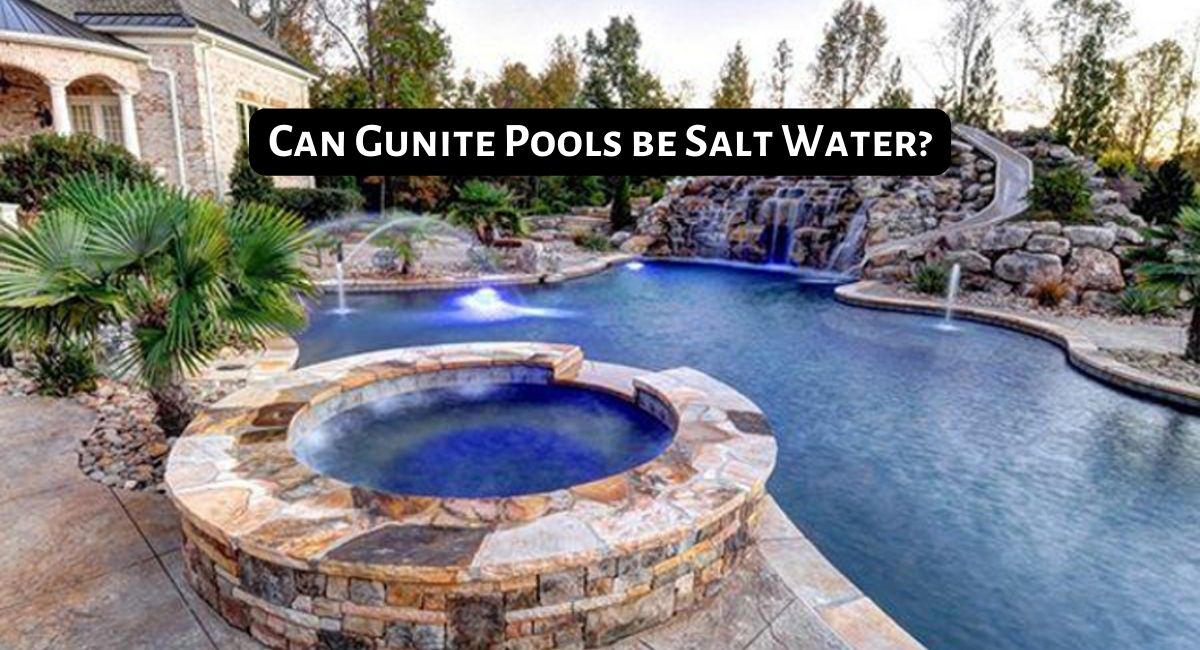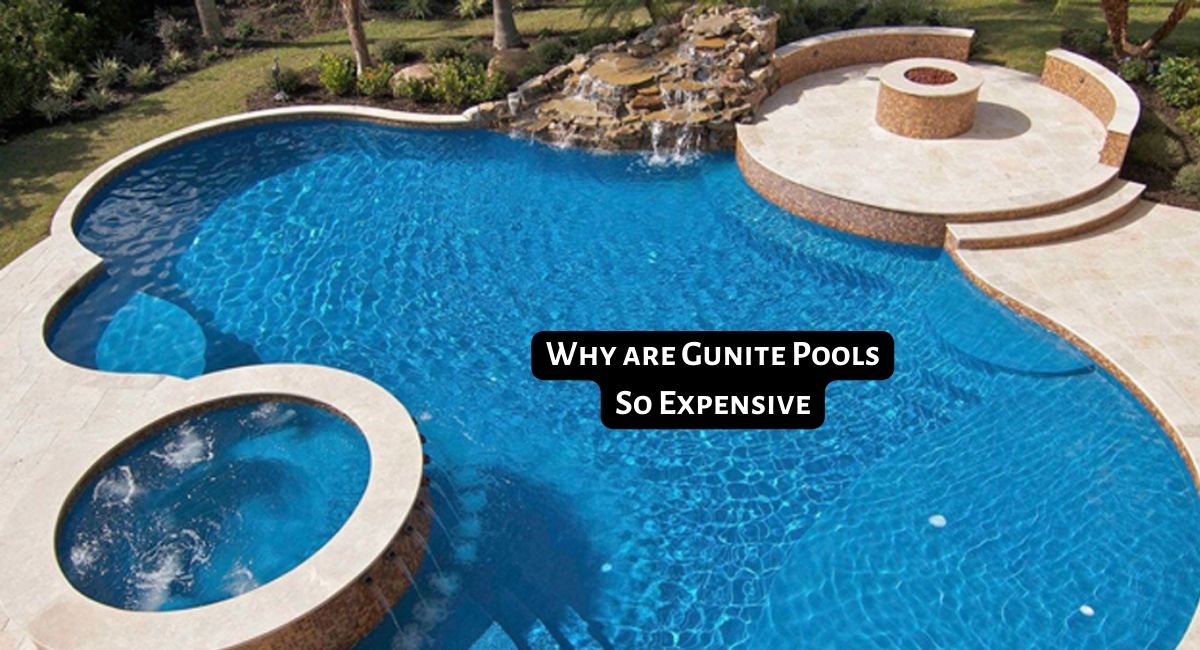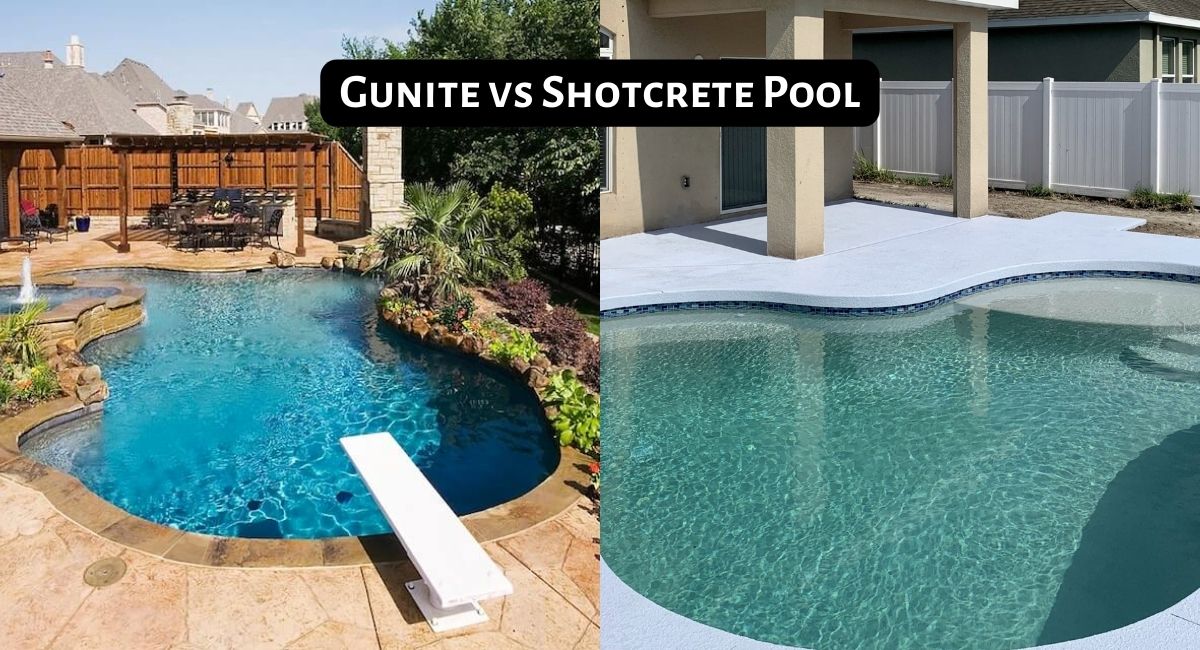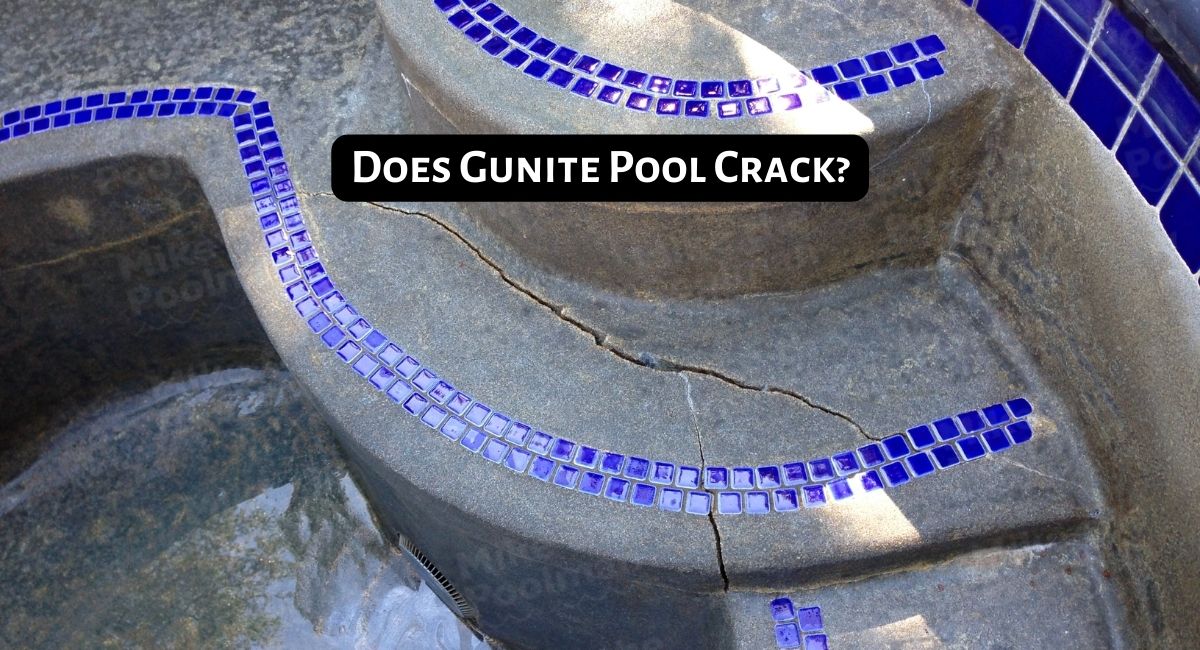Are you considering installing a gunite pool but unsure if it can handle a salt water system? You’re not alone. Many pool owners are hesitant about the compatibility of gunite pools with salt water.
But fear not, in this article, we’ll dive deep into the question: Can gunite pools be salt water? We’ll uncover the truth and provide you with all the essential insights you need to make an informed decision.
So, if you’re ready to explore the possibilities and discover the advantages of a salt water system for your gunite pool, keep reading.
Table of Contents
- 1 Can Gunite Pools be Salt Water
- 2 Advantages of Using a Saltwater System
- 3 Disadvantages of Using a Saltwater System in a Gunite Pool
- 4 Factors to Consider When Installing a Saltwater System
- 5 Salt Water Gunite Pool Conversion Process
- 6 Tips for Maintaining Your Salt Water Gunite Pool
- 7 Cost Implications of Saline Gunite Pools
- 8 Special Considerations for Gunite Pools
- 9 Conclusion
- 10 Frequently Asked Questions
Can Gunite Pools be Salt Water
Yes, gunite pools can be converted to saltwater. However, while gunite, a concrete mixture, is known to be durable and versatile, it’s essential to understand how this material reacts to salt water.
Salt is corrosive by nature, and over time, it can leach calcium out of the gunite, leading to potential surface issues. The use of a reliable waterproofing sealer can help protect the gunite from potential damage.
In addition to the pool surface, the pool equipment may also be affected by salt water. Corrosion-resistant materials or coatings are often required for things like pool ladders, light fixtures, and other metal components to prevent damage.
The replacement or upgrade of certain pool accessories might be necessary as part of the conversion process. It’s advisable to consult with a pool professional who can assess the current state of your gunite pool and recommend necessary upgrades or modifications.
Every pool is unique, and the conversion process can be complex. However, with proper planning and care, a gunite pool can indeed be a salt water oasis.
Advantages of Using a Saltwater System
Saltwater pools offer several benefits for Gunite pools, making them an attractive choice for many pool owners. Here are some of the advantages of using a saltwater system in a Gunite pool:
Less Maintenance: Saltwater systems automatically convert salt into chlorine as the water passes through the system, self-chlorinating the water. This eliminates the need for frequent water testing and required adjustments in chlorination, lessening the maintenance time involved.
Health and Comfort: Saltwater systems are gentle on the eyes, skin, and hair because the salt concentration is similar to that in a human tear. Additionally, saltwater pools do not generate harmful levels of chloramines, which can trigger allergies and asthma.
Cost Effective: Though saltwater systems have a higher upfront cost, their maintenance costs are much lower than traditional chlorine pools. Traditional pool owners have to buy, transport, and store chlorine chemicals regularly, a need that saltwater system owners avoid.
Safer: Saltwater systems eliminate the need for storing hazardous chemicals. Chlorine poses risks related to fire, inhalation, or skin contact. As saltwater systems generate chlorine on-site, these risks are significantly reduced.
Environmentally Friendly: Saltwater systems are more eco-friendly as they eliminate the need for production, transport and disposal of chlorine. The conversion of salt into chlorine on-site significantly lessens the carbon footprint.
Better Feel: Water in saltwater pools has a silky and soft feel that is considered more appealing and refreshing than the stiffer feel of traditional chlorinated water.
Longevity: The water chemistry in a saltwater pool is less harsh compared to chlorinated pools, enhancing the lifespan of pool equipment, as well as pool liners, and finishes.
Cleaner Water: The chemical production mechanism in saltwater systems is more sophisticated than in traditional pools, leading to clearer, more stable and cleaner water. This helps reduce the use of additional chemical sanitation methods and cleaning equipment.
Less Water Waste: Saltwater systems keep the water balance stable, minimizing the need for draining and refilling which is often necessary in traditional chlorine pools due to chemical imbalances.
Overall Appeal: A saltwater pool presents a more upscale and appealing image compared to a traditional chlorine pool. For those considering property resale value, a saltwater pool can be a more attractive amenity to potential buyers because of the above-mentioned benefits.
Disadvantages of Using a Saltwater System in a Gunite Pool
While saltwater systems offer several advantages for Gunite pools, they also come with some disadvantages and challenges that pool owners should be aware of. Here are the disadvantages of using a saltwater system in a Gunite pool:
Initial Costs: The upfront costs involved in installing a saltwater system in a gunite pool are relatively high, taking into account the cost of buying and installing the saltwater chlorinator, and purchasing the initial amount of salt required.
Complexity: Operating a saltwater system requires a certain level of understanding and knowledge. Issues like keeping the correct salt levels or balancing the water chemistry precisely can become complicated. Incorrect usage or neglect might lead to significant problems.
Potential Corrosion: The salt content in saltwater pools could cause corrosion to certain components within and around the pool, specifically those made of metal. This means any metal equipment such as ladders or underwater lights, or even pool-side furniture could experience accelerated wear and tear.
Electrical Cost: Since saltwater systems use electrolysis to convert salt into chlorine, they consume electricity. Frequent usage or high chlorination level might increase your energy bill noticeably.
Frequent Inspections: The cell within the saltwater system that handles the process of converting salt into chlorine can get coated with mineral deposits or get clogged. Hence, it requires regular cleaning and inspection to ensure efficient chlorine production.
Salt Residue: The salt in the water can leave a white, dusty residue around the waterline of the pool, which can cause surface damage or discoloration over time and requires frequent cleaning to prevent any lasting effects.
The Need for Special Equipment: Because of the corrosive nature of the salt water, saltwater pools require equipment and accessories which are salt-resistant to prevent severe corrosion or deterioration.
Water Salinity: The efficiency of saltwater systems is dependent on maintaining an optimal salt concentration in the pool. Hence, it needs regular testing and possibly adding more salt to maintain the right concentration.
Lower Temperatures: Saltwater systems may struggle to produce enough chlorine when pool water temperatures drop, which may imply the necessity of an additional sanitizer during the cooler months.
Detrimental to Plants: Saltwater can be harmful to the surrounding vegetation. If the pool water regularly splashes onto the plants and grass around the pool, the salt content may lead to plant dehydration, salt burn, or in some cases, even the death of the plant.
Factors to Consider When Installing a Saltwater System
Installing a saltwater system for a Gunite pool requires careful consideration and planning to ensure that the system works effectively and that your pool remains in good condition. Here are the key factors to consider:
- Size of your Pool: Pools come in different sizes, and the system should be able to handle the volume of water in yours. Pool size is usually measured in gallons, and you’ll need to choose a system that can adequately handle the volume of your pool. A system that is too small will struggle to keep your water clean and will break down quickly due to overuse.
- Quality and Type of Salt: The salt used in your saltwater system plays a crucial role in its efficiency. Only high-quality, non-iodized, and dye-free salt should be used in your system. Iodized salt can cause staining on the pool surface, while salt with added colored dye can tint the water.
- Cost: The cost considerations go beyond the initial purchase of the system. You also need to consider the cost of regular maintenance and how much electricity the system uses. While saltwater systems often require a higher initial investment, they are generally cheaper to run and maintain in the long run.
- Environmental Conditions: The efficiency of saltwater systems can be significantly influenced by environmental factors like the amount of sun exposure and rainfall. Sun exposure can lower chlorine levels, which are necessary for sanitizing your pool. On the other hand, heavy rainfall can dilute the salt concentration, making the system work harder to maintain balance.
- Pool Use: The more frequently your pool is used and the more users it has, the more contaminants are introduced into the water. This will necessitate more frequent monitoring and cleaning. You might need a larger, more robust saltwater system if your pool sees a lot of use to maintain good water conditions.
- Quality of Water: Water quality plays a significant role in the effectiveness of your saltwater system. Hard water (high mineral content) can cause scaling on your equipment and pool surface, while soft water (low mineral content) may be corrosive to your pool equipment. The ideal situation is balanced water with a neutral pH.
- Installation: An improperly installed saltwater system will not function correctly and could even damage your pool. Therefore, it’s crucial to have the system installed by a trained, reputable professional. You should also consider whether the installation includes necessary adjustments to accommodate the system.
- Maintenance: Like any other type of pool sanitizing system, saltwater systems require regular maintenance to function adequately. This includes checking for salt levels, pH and chlorine levels, and regular cleaning. Some models may require more regular maintenance than others, so it’s worth investigating this aspect before choosing a specific model.
- Compatibility: Not all saltwater systems are universally compatible with any pool or filtration setup. Therefore, it’s important to choose a system that works with your current pool planes, equipment, and infrastructure.
- Warranty: A good warranty can prevent unanticipated repair or replacement costs. Check for the warranty period and what particular parts are covered. A more extended warranty usually indicates that the manufacturer is confident in the quality of the system.
- In-Pool Features: If your pool has unique features like a spa, waterfall, or specialty sanitizing systems, you’ll need a saltwater system that works with these features without losing efficiency or causing damage.
- Local Regulations: Local city or state laws and homeowner association rules may place restrictions on the use of certain types of pool systems. Make sure to check these laws to prevent possible violations.
Salt Water Gunite Pool Conversion Process
Transforming a traditional gunite pool into a saltwater pool requires careful planning, attention to detail, and, in most cases, professional assistance. Below is a general roadmap of the conversion process.
- Assessing the Pool: The first step is to inspect the current condition of the pool. This includes checking the integrity of the gunite surface, pool equipment, and any metal components for signs of wear or damage that could be exacerbated by saltwater.
- Materials Needed: The major equipment needed for conversion includes a saltwater chlorine generator, pool-grade salt, and possibly new pump and filtration systems. Additional salt-resistant hardware may also be necessary.
- Removing Existing Water: Before the conversion, the existing water in the pool will need to be entirely drained, and any leftover debris should be cleaned out.
- Gunite Treatment: To prevent the salt from degrading the gunite surface, applying a sealant may be necessary.
- Installation of the Chlorine Generator: The saltwater generator will need to be installed into the pool’s circulation system. It’s advised to get this done by professionals to avoid any installation mishaps.
- Adding salt: After refilling the pool, the correct amount of pool-grade salt is added. Even distribution of the salt is crucial for the generator to effectively convert it into chlorine.
- Start the System: Once everything is set up properly, the system can be started and the saltwater generator can begin producing chlorine.
- Testing and Balancing the Water: Lastly, the pool’s water will need to be tested to ensure the correct balance of chemicals. This may take a few days of adjustments to get it right.
Professional pool servicemen can provide guidance throughout this process to ensure a successful transition to a saltwater system. Like all pool systems, a properly maintained saltwater pool can offer years of enjoyment.
Tips for Maintaining Your Salt Water Gunite Pool
Maintaining a salt water gunite pool requires routine upkeep to ensure optimal pool health. While the salt water system reduces the need for managing chlorine levels, some specific key points must be attended to:
- Check Salinity Levels: Keep an eye on the salinity levels in your pool frequently. The ideal salt range for most chlorinators is between 2700 ppm and 3400 ppm (parts per million).
- Monitor pH Levels: Regular pH testing is crucial, as imbalances can lead to skin and eye irritation for swimmers, or potential damage to your pool infrastructure. Aim to maintain a pH level between 7.2 and 7.8.
- Maintain Calcium and Stabilizer Levels: The level of calcium and cyanuric acid (pool stabilizer or conditioner) should be tested and adjusted periodically. Calcium hardness should be within 200 – 400 ppm, and stabilizer levels should be around 70-80 ppm in a saltwater pool.
- Clean the Salt Cell: Over time, calcium and other minerals can build up on the salt cell, inhibiting its performance. The cell in the chlorine generator should be inspected regularly for scaling and cleaned as needed.
- Check Your Equipment: Regularly inspect your pool’s equipment for signs of any salt damage. Be watchful for corrosion to the pool’s light fixtures, heaters, masonry work, etc.
- Routine Cleaning: Regular pool cleaning should include brushing the walls and floor, cleaning out strainer baskets, and vacuuming when necessary. Regular backwashing of the filter will also keep your pool clean and clear.
Remember, climate and seasonal changes will affect the chemistry of your pool. It’s vital to adjust your maintenance schedule to accommodate these changes. Depending on your comfort level, you can either take on these tasks yourself or hire a professional to maintain your saltwater gunite pool.
Cost Implications of Saline Gunite Pools
Converting a gunite pool to a saltwater system does require a significant initial investment, but it can also save you money over time when compared to the ongoing costs of maintaining a traditional chlorine pool. Here are the main cost implications to consider:
- Conversion Cost: The average cost to convert a chlorine pool to a saltwater system can range from $1,500 to $2,500, depending on the pool size and the chosen system. This cost typically includes a saltwater chlorine generator and other needed equipment, plus professional installation.
- Maintenance Cost: Ongoing costs are generally lower compared to a chlorine pool. You can save on the continuous buying of chlorine tablets, shocks, and stabilizers—these costs are substantially reduced as the saltwater generator produces its own chlorine from the salt. Regular expenses would include buying salt, checking and adjusting chemical balance, and cleaning.
- Salt Cell Replacement: The salt cell in a chlorine generator doesn’t last forever and needs replacement typically once every 3-7 years, and can cost between $200 to $700 depending on the model.
- Potential Damage Repair: Though not a regular cost, keep in mind the potential for salt damage. Salt can corrode fixtures, and as a result, you may need to replace ladders, railings, underwater lighting fixtures, and other similar metallic components more frequently than you would with a freshwater pool.
While there might be immediate costs involved for the conversion, the long-term financial benefits could outweigh these initially. Integrating saltwater systems often lead to less maintenance hassle and costs, making the investment worthwhile. As with all major investment decisions, it’s helpful to consult with professionals to fully understand the potential cost implications.
Special Considerations for Gunite Pools
When you are considering converting to a salt water system for a gunite pool, there are several special considerations to keep in mind:
- Longevity of Salt Water Systems: Salt water systems are durable, but the salt cells used in chlorine generators have a lifespan too. They typically last between 3-7 years, after which they need to be replaced.
- Effect on Pool Surface: Salt can potentially cause wear and tear on the gunite surface of your pool over time. The application of a sealant and regular maintenance can help prolong the life of the pool surface.
- Corrosion: Salt has a corrosion effect on certain materials, despite being in a diluted solution. Pool features or equipment made from certain metals, including some grades of stainless steel, may corrode over time. It might be necessary to upgrade these components to more salt-resistant materials.
- Balancing Chemical Levels: The chemical balance of a saltwater pool is slightly different from a traditional chlorine pool. Saltwater pools have special requirements when it comes to pH, alkalinity, and calcium hardness levels, which require monitoring.
- Consult a Pool Professional: Converting to a salt water system is a significant step, involving changes to both the pool’s structure and its maintenance routines. It’s always beneficial to consult with a pool professional who can offer advice based on your specific situation and needs. They can provide useful information on optimal pool performance, maintenance requirements, and potential long-term considerations.
Therefore, before transitioning your gunite pool into a salt water system, thorough research and professional guidance are recommended to help understand the process, maintenance, and potential financial implications in the long run.
Conclusion
The question of whether gunite pools can be converted to saltwater has been thoroughly explored. Through our analysis, it is evident that the answer is a resounding yes. The durability and versatility of gunite make it an ideal choice for those looking to enjoy the benefits of a saltwater pool.
By understanding the necessary modifications and maintenance, gunite pool owners can confidently transition to a saltwater system.
Not only does this conversion enhance the swimming experience, but it also offers numerous advantages, including reduced chemical usage and improved water quality.
Whether it’s for health, sustainability, or simply personal preference, the option to convert gunite pools to saltwater provides pool owners with a long-lasting and rewarding investment.
Frequently Asked Questions
1. Does salt water pool damage plaster?
No, saltwater pool does not damage plaster. Plaster is a highly durable material that is resistant to most types of wear and tear, including the effects of salt in swimming pools. In fact, many gunite pools are now using saline systems as an effective way to sanitize the water without harsh chemicals. However, it is important to ensure regular maintenance for your pool to prevent any potential problems with its durability over time. Regular brushing and vacuuming will help keep your gunite pool looking great regardless of whether you use salt or traditional chemical treatments.
2. How long does concrete last in salt water?
Concrete can have a long lifespan in salt water environments, with proper maintenance and care. Regular inspections and repairs can help extend its durability, but the exact lifespan of concrete in salt water can vary depending on factors such as water chemistry, exposure to salt, and quality of initial construction.
3. Can bacteria grow in saltwater pool?
Bacteria can still grow in saltwater pools, although the saltwater’s chlorine content can help inhibit bacterial growth. However, it’s important to maintain proper water chemistry, regularly test and balance chemical levels, and ensure adequate filtration and sanitation to minimize the risk of bacterial growth.
4. Is a salt water pool healing?
Saltwater pools can provide a more gentle swimming experience since the water contains lower levels of chemicals, primarily chlorine. This may be perceived as more soothing to the skin and eyes compared to traditional chlorine pools. However, the healing properties of a saltwater pool are subjective and can vary depending on individual preferences and sensitivities.
5. Do salt water pools need other chemicals?
While a saltwater pool’s chlorine is generated through a saltwater chlorine generator, other chemicals are still necessary to maintain proper water chemistry. This includes balancing pH levels, managing alkalinity and calcium hardness, and periodically adding other chemicals as needed to ensure the water remains clear, safe, and comfortable for swimming. Regular testing and adjustment of these chemical levels are important for proper pool maintenance.



